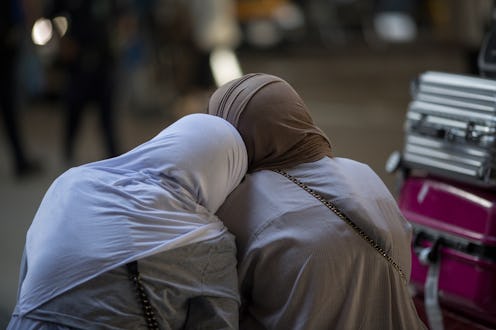News
Trump's Refugee Ban Ends Today — But There's A Catch

In June, the Trump administration put a 120-day halt on the admission of refugees into the United States. This temporary refusal of refugees came in tandem with President Trump's so-called travel ban on visitors from several majority-Muslim countries. But that 120-day period is ending, and the United States is now set to accept refugees from every country in the world, as Trump's refugee ban will be lifted, with an announcement of the new plan expected Tuesday.
Update: A source in the administration and an advocacy group official have confirmed to The Atlantic that the 11 countries subject to stricter requirements for refugee admittance are: Egypt, Iran, Iraq, Libya, Mali, North Korea, Somalia, South Sudan, Sudan, Syria, and Yemen.
Earlier: Intense scrutiny awaits refugees as the previous process entailed less demanding requirements for admission. And Trump has dramatically reduced the number of refugees allowed into the United States to less than half of what President Obama set in fiscal year 2017. Obama had set the cap at 110,000; Trump has dropped it to 45,000.
According to a source familiar with the new rules, refugees from 11 countries will face a much more intensive vetting process, and it's expected to significantly slow down their applications.
All refugee applicants will be subject to more thorough background checks. Expanded use of social media data mining will also be part of the new regulations. Additionally, officials at U.S. Customs and Immigration Services will recieve extra training in how to detect fraud on applications.
Trump promised "extreme vetting," and the expected rules to guide refugee applications going forward appear crafted to follow through on that pledge.
As the AP notes, refugees were already subject to stringent application requirements, and wait time for entry into the United States often stretched into years. The Trump administration's latest guidelines will almost certainly make those waiting periods even longer.
One of the proposed tactics — mining social media for evidence of terrorist affiliations or sympathies — was scrapped by the Obama administration precisely because it requires significant time investment and manpower. Scrolling through infinite Facebook posts or Twitter feeds is labor intensive, and while it could certainly be a productive use of time, it could hardly be described as efficient.
That might in part explain why Trump's maximum cap on refugees is so low. If anyone admitted must be thoroughly investigated by a team of people looking into government documents and records, as well as a person's far-flung dealings on the internet, then application approval will be slow.
And it's important to note there is no minimum cap, so the Trump administration can approve as few refugee applicants as they deem appropriate.
For refugees fleeing immediate danger, there are often no obvious or feasible ways to ensure they can prove their identity and guarantee their refugee applications get approved. Governments in upheavel — take the Syrian regime in Damascus as an example — are often incapable or unwilling to provide U.S. officials with the documentation needed to authenticate a refugee's identity. Excessively demanding documentation requirements for admission into the United States could shut down refugees altogether from certain areas.
Many see this change in refugee policy as coming at a very bad time. The civil war in Syria is not yet over, with an estimated 11 million people forced from their homes.
Meanwhile, in Myanmar there is another mass group of refugees now fleeing genocide.
That's how Dr. Azeem Ibrahim, a senior fellow with the Center for Global Policy, describes the Rohingya Muslims fleeing government forces in that country. The ethnic minority has had a substantial presence in Myanmar since the 12th century, but they've never been recognized or granted citizenship by the government. According to Ibrahim, a group of "extremist Buddhist monks" have been preaching that the Rohingya are descendants of insects — that they are not human — and that killing them is thus justified. More than 600,000 Rohingya Muslims have fled Myanmar, and will need more permanent shelter.
With heightened requirements for approved refugee admission, the United States will not be able to help the Rohingya, or any other oppressed peoples, as much as many would hope.